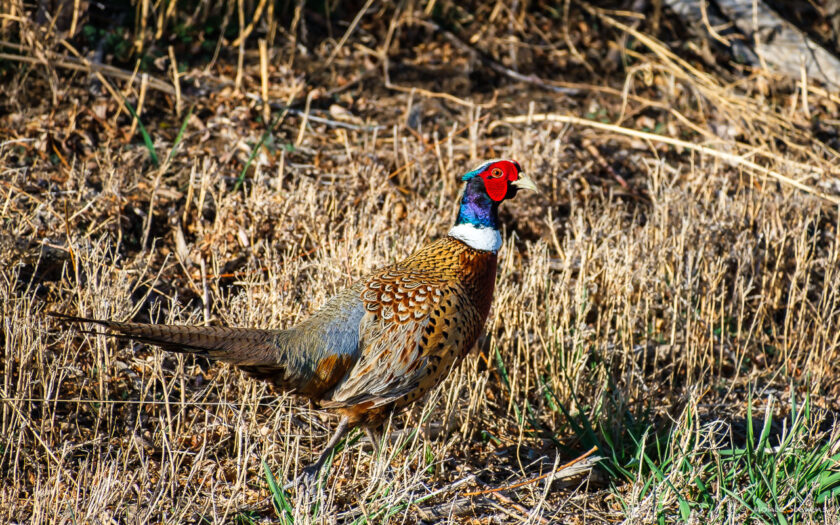Nature truly is the artist! It does not need to be some majestic view over a vast plain or canyon but it can be the beauty of a ring-necked pheasant scampering along the road. The details, colors and design in those feathers is amazing. As years increase in my life, I see more and more of natures craftsmanship and gifts.
Male Ring-necked Pheasants are flashy birds with red faces and an iridescent green neck with a bold white ring. The male’s very long tail is coppery with thin, black bars. Females are brown with paler scaling on the upper parts; buff or cinnamon underparts with black spotting on the sides; and thin, black bars on their tails. They hang around open fields and weedy roadsides. And, they have this strange gate where their heads bob back and forth when the walk. Such a majestic, colorful gift of nature! Will leave shortly to have lunch with my youngest daughter. Always a wonderful treat! Have a great day!

6 Comments
geri oster
WONDERFUL! Reminds me of the farm in SE South Dakota where pheasants were abundant. For two or three years, when I was grade school age, our family raised pheasant chicks, a hundred a batch, for the conservation district. Fun memories. Thank you, Monte. And a stunning picture!
Monte Stevens
You are welcome, Geri. My cousins, who live in the Texas panhandle have memories of plenty of pheasants and quail in the past. We have taken away much of their habitat as well as restore some. They are so beautiful!
Mark
Detroit has quite the pheasant population – yep… urban pheasants!! There was even a complete documentary on them.
Monte Stevens
Oh, Wow, Mark. I just watched a video on them in Detroit. I actually like the idea of keeping some areas groomed for them. My understanding is the pheasants are not invasive of plants or other species. I’ve never seen one in the city, only out east in plains.
Faye White
Magnificent fellow! I don’t think I’ve ever seen one in ‘person’ . lol
Monte Stevens
Thanks, Faye. A few years ago I tried hunting them but had no luck and am glad I didn’t kill any. I do not see many of them along the Front Range. They range out east. I know they do a lot of hunting in Kansas, Nebraska, North and South Dakota and into Iowa. Lots of farm land with habitat for them. I also hear them more than I see them. They have a distinct rooster type call.